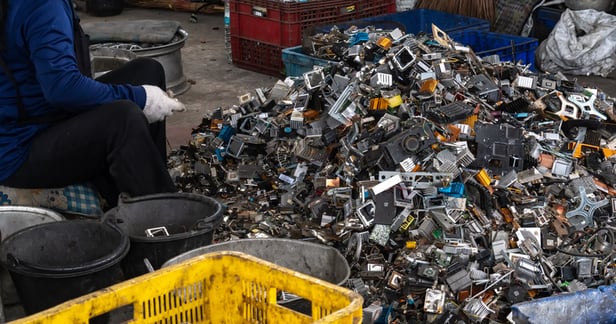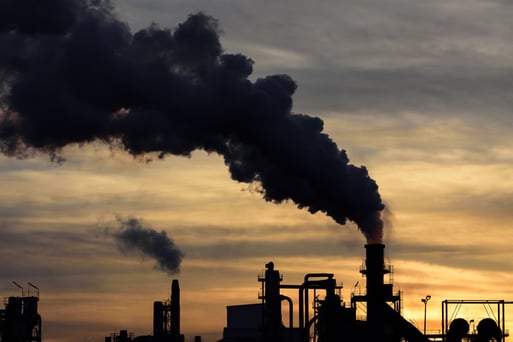COP30: Week 1 Overview
-1.png)
The first week of COP30 in Belém has already produced dozens of headlines and high-level commitments.
However, in a complex sector like ours, it can be challenging to understand how global diplomacy translates to the warehouse floor.
That's why this recap is different. We are filtering the broad discussions to focus exclusively on the notable actions and outcomes that concern the electronics industry.
Our analysis will specifically unpack the decisions that will impact Original Equipment Manufacturers (OEMs) and Electronics Manufacturing Services (EMS) companies, from new directives on supply chain transparency to the growing push for circularity and the use of sustainable materials.
.png?width=425&height=532&name=COP30%20Recap%20(15).png)
Day 1: Technology, AI, and Traceability Take Centre Stage

COP30 opened with a strong emphasis on implementation, digital systems, and data integrity. For electronics, Day 1 set the tone for what future supply chains will be expected to deliver.
1. Launch of the Green Digital Action Hub
This new online platform was launched to help scale up green technologies, reduce the environmental footprint of technology, and ensure access to sustainable digital solutions for all.
- Why this matters:
Governments will expect accurate climate data, low-energy digital systems, and transparent sourcing from companies.
- This also has major implications for how e-waste and emissions are monitored. The institute’s open-access tools will support more transparent reporting of greenhouse-gas emissions, reductions, and e-waste data from countries and technology companies, raising the bar for accountability across the electronics sector.
2. Establishment of the AI Climate Institute (AICI)
The AI Climate Institute (AICI), a new global initiative launched at COP30, aims to equip people and institutions in developing countries with crucial skills to harness artificial intelligence (AI) for climate action.
The institute will offer training programs and a Digital Learning Repository featuring courses and case studies on climate applications across various sectors.
3. Digital Public Goods (DPG) for Climate
A new Plan to Accelerate Solutions (PAS) was published, including the launch of the Climate DPG Collection, a repository of over 20 open-source digital tools that support climate reporting across disaster response, energy, water, and agriculture.
- Why this matters:
As governments adopt more advanced data systems and more countries adopt shared digital tools for climate reporting, electronics suppliers will be expected to provide precise, verifiable data on emissions, material use, and end-of-life outcomes. - Opaque supply chains will struggle to meet future reporting requirements.
4. Circularise Named a Winner in the DPI for People & Planet Innovation Challenge
The DPI for People and Planet Innovation Challenge awarded $100,000 grants to five innovators. Notably, one of the winners was Circularise, a digital traceability platform that uses blockchain to track materials across complex supply chains, from raw extraction through manufacturing, use, and end-of-life.
- Why this matters:
Circularise's recognition indicates that end-to-end material transparency is now becoming a policy expectation rather than a sustainability advantage.
- This means that electronics manufacturers will increasingly be required to prove the origin of components, the handling of materials, and the actual environmental impact of every product.
Read more about the importance of component traceability in the supply chain and how Component Sense guarantees full traceability to the original manufacturer for every component we redistribute.
Day 2: Circularity, E-Waste, and Green Procurement Move Centre Stage

Day 2 shifted from ambition to action, with practical, funded initiatives that directly impact the electronics sector.
1. Brazil’s National E-Waste “Mutirão”
Brazil showcased its national drive to tackle electronic waste, which included:
- 1,000+ tonnes of e-waste collected
- 100 refurbished computers donated
- 2,700 young people trained in sustainable electronics handling
- Why this matters:
E-waste is no longer treated as a standalone waste issue. It is now part of national adaptation, climate justice, and digital inclusion strategies. - This strengthens the global push toward circular electronics supply chains.
Read more about why sustainable supply chains matter, and how they can drive profitability too.
2. ‘Beat the Heat’ Implementation Drive
Beat the Heat is a flagship Plan to Accelerate Solutions supporting UNEP and COP30’s global rollout of cooling and heat-resilience measures under the Global Cooling Pledge.
The initiative unites 36 countries and 83 partners to deliver heat-action and urban greening plans across 185 cities, aiming to reduce extreme heat risks for 3.5 billion people worldwide.
- Why this matters:
- The plan explicitly calls for the public procurement of high-energy efficiency cooling technologies, such as fans, evaporative coolers, and efficient ACs.
- Since this is a funded implementation drive, it will create immediate, large-scale demand for specific, high-efficiency electronic components as cities begin upgrading their infrastructure.
3. Global Push for Sustainable Buildings
COP30 advanced global action on buildings, with ministers from over 60 countries endorsing the Belém Call for Action. The agreement commits governments to integrate climate goals into housing policy, expand green finance, and prioritise low-carbon, climate-resilient homes.
By 2035, national housing strategies will align with the Chaillot Declaration, avoid high-risk zones, and report progress annually.
- Why this matters:
Climate-aligned buildings depend on HVAC systems, lighting, sensors, automation, and energy-management devices, all built from electronic components. - New global standards will require manufacturers to demonstrate efficiency, traceability, and their carbon footprint.
Read more about how we reduce our carbon footprint through sustainable shipping practices.
Day 3: Skills, Extraction, and Information Integrity Reshape Expectations

Though Day 3 focused on people and justice, it delivered important signals for electronics supply chains.
1. A Global Shift Toward Low-Carbon Skills
The Global Initiative on Jobs & Skills for the New Economy highlighted 375 million climate-transition jobs and 280 million adaptation jobs that are expected to be created over the next decade.
- Why this matters:
A global shift toward low-carbon skills means that future workforces, including engineers, technicians, procurement teams, and manufacturers, will be trained in repair, reuse, traceability, and accurate climate reporting.
2. Indigenous Leadership Shapes Global Adaptation Policy
Indigenous leaders from across regions exchanged experiences and best practices on adaptation planning methodologies, demonstrating how ancestral knowledge and local governance can shape national and global policy, including by being reflected in the indicator framework of the Global Goal on Adaptation (GGA).
- Why this matters:
Indigenous communities are often located near mining regions for critical minerals. Stronger Indigenous participation means greater scrutiny of extraction practices across the electronics manufacturing industry and higher expectations for ethically sourced materials.
Read more about how Component Sense drives sustainability, including by reducing the need for resource extraction.
3. Information Integrity Becomes a Climate Priority
The 2024 UN Risks Report identified misinformation as one of the top global vulnerabilities to effective climate action and climate governance. In this context, COP30 is the first COP featuring information integrity as a key objective.
To accelerate implementation, the initiative outlined a 2028 plan that will:
- Support more than ten countries in developing new legal frameworks for information integrity.
- Mobilise USD 10 million through UNESCO’s Global Fund for Information Integrity on Climate Change, with priority for the Global South.
- Establish a Charter of Principles for Accountable Climate Advertising, to be adopted by at least fifteen major publishers, digital platforms, and AI firms by 2028.
- Why this matters:
As information integrity becomes a formal part of climate governance, every environmental claim made by companies, including emissions reductions, sourcing practices, and circularity impacts, will face tighter scrutiny. - This means far less tolerance for greenwashing.
Day 4: Health, Justice, and Global Standards Raise Expectations for Supply Chains

Day 4 focused on Health, Justice, and Human Rights, but the most significant takeaways for the electronics industry came from major announcements on finance, carbon accounting, and critical infrastructure resilience.
1. FINI: A $1 Trillion Adaptation Pipeline
- The Fostering Investible National Planning and Implementation (FINI) for Adaptation & Resilience initiative was launched. FINI’s objective is to transform National Adaptation Plans (NAPs) into concrete, finance-ready projects.
- FINI targets creating a $1 trillion adaptation project pipeline by 2028, with a significant portion expected from private investors.
- Why this matters: Adaptation projects involve building resilient infrastructure, especially Early Warning Systems (EWS) and climate-resilient health systems (as outlined in the Belém Health Action Plan).
- This demands massive investment in reliable electronics and components for sensors, monitoring systems, data centers, and telecommunications equipment.
2. Alignment of Global Carbon-Accounting Standards
Discussions under a new Plan to Accelerate Solutions (PAS) focused on harmonising global carbon-accounting standards to improve consistency between government and private-sector reporting.
ISO and the GHG Protocol identified priority areas for international cooperation and outlined next steps to develop a shared carbon-accounting framework, supported by science-based, inclusive collaboration across governments, industry, and standard-setting bodies.
- Why this matters: Lifecycle data and precise emissions reporting will soon be required, not optional. Redistributing components allows companies to report significantly lower product-level emissions.
3. Justice and Human Rights Move Into Climate Governance
Day 4 highlighted the growing link between climate action and human rights, with the judiciary formally entering COP discussions for the first time.
Justice Day brought together judges and legal leaders to strengthen international cooperation and develop legal approaches to address the climate crisis. Speakers called for courts to help “induce behaviour” and hold “climate offenders” accountable, underscoring the role of legal systems in protecting people and the planet.
- Why this matters:
- Governments and courts are more likely to enforce human rights and environmental standards through legal action. For electronics, this means tighter oversight of labour conditions, mineral sourcing, and waste practices.
- Companies that can demonstrate low-impact, traceable, and resource-efficient sourcing, such as redistribution, will be better positioned as legal expectations rise.
Leading the Shift Toward Transparent, Circular Supply Chains

At Component Sense, we are already operating in the future that COP30 is calling for.
We are passionate about:
- Keeping components in circulation, reducing demand for new mining, resource extraction, and unnecessary manufacturing
- Building traceability, integrity, and data transparency into every process
- Providing verifiable data and traceability for every part
- Helping manufacturers report lower emissions and align with emerging climate standards
And this November, we’re going even further:
For every order placed, we’re planting 10 trees through our Green Friday initiative, supporting global reforestation while building resilient, circular supply chains.
What’s Next
Week 2 begins Monday, and we’ll be sharing more live insights on how COP30 is shaping the future of electronics, traceability, and circularity.
If you’re ready to strengthen your supply chain through redistribution, get in touch with our expert team today.